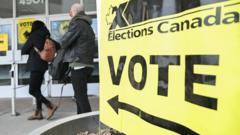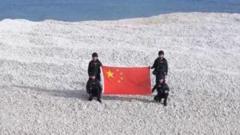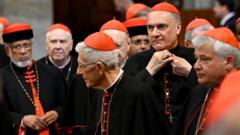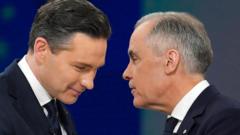In the face of President Trump’s provocative comments, Canada’s national elections take on new significance, reflecting a struggle for sovereignty amidst external pressures.
**Canada’s Election Under Trump's Shadow: A Test of Sovereignty and Identity**

**Canada’s Election Under Trump's Shadow: A Test of Sovereignty and Identity**
As America’s influence looms large, Canadian voters confront the challenge of maintaining independence.
April 28, 2025, 12:34 p.m. ET
On Canada's election day, President Trump has once again made waves by insisting that Canada should become the 51st state of the United States. This declaration, made on social media as polls opened, showcases Trump's ongoing discourse about Canadian sovereignty. Characterizing Canada as a “beautiful landmass,” he emphasized that the border is an “artificially drawn line” and suggested that Canadians should support the candidate most aligned with his vision of annexation.
Trump's sustained rhetoric, which has historically questioned Canada’s identity as a separate nation, has influenced the electoral landscape significantly. His administration's tariffs have strained economic relations, pushing Canada toward recession while simultaneously galvanizing its political organizations. As fear and resentment of American influence grows, the Liberal Party, led by Prime Minister Mark Carney, has revived politically, positioning itself as the defender against Trump's agenda, while the Conservative Party faces internal dissent regarding their alignment with Trump’s ideologies.
The implications of Trump’s comments are multifaceted. Analysts are divided on whether his statements favor Pierre Poilievre, the Conservative leader often criticized for mimicking Trump's stance, or if they inadvertently bolster Prime Minister Carney's anti-Trump message. This peculiar political landscape leaves Canadian voters with the task of asserting their independence while navigating the complexities of external pressures.
Responding to Trump’s remarks, Poilievre issued a forceful statement, reinforcing that only Canadians will dictate their future. “President Trump, stay out of our election,” he declared on X. Echoing this sentiment, Carney emphasized Canadian autonomy through a video claiming, “This is Canada, and we decide what happens here.”
As the election unfolds amidst these unprecedented tensions, the resulting government will grapple with maintaining Canada’s sovereignty while counteracting the strains of external influences, particularly from a U.S. president who remains focused on integrating Canada into a broader American framework.
On Canada's election day, President Trump has once again made waves by insisting that Canada should become the 51st state of the United States. This declaration, made on social media as polls opened, showcases Trump's ongoing discourse about Canadian sovereignty. Characterizing Canada as a “beautiful landmass,” he emphasized that the border is an “artificially drawn line” and suggested that Canadians should support the candidate most aligned with his vision of annexation.
Trump's sustained rhetoric, which has historically questioned Canada’s identity as a separate nation, has influenced the electoral landscape significantly. His administration's tariffs have strained economic relations, pushing Canada toward recession while simultaneously galvanizing its political organizations. As fear and resentment of American influence grows, the Liberal Party, led by Prime Minister Mark Carney, has revived politically, positioning itself as the defender against Trump's agenda, while the Conservative Party faces internal dissent regarding their alignment with Trump’s ideologies.
The implications of Trump’s comments are multifaceted. Analysts are divided on whether his statements favor Pierre Poilievre, the Conservative leader often criticized for mimicking Trump's stance, or if they inadvertently bolster Prime Minister Carney's anti-Trump message. This peculiar political landscape leaves Canadian voters with the task of asserting their independence while navigating the complexities of external pressures.
Responding to Trump’s remarks, Poilievre issued a forceful statement, reinforcing that only Canadians will dictate their future. “President Trump, stay out of our election,” he declared on X. Echoing this sentiment, Carney emphasized Canadian autonomy through a video claiming, “This is Canada, and we decide what happens here.”
As the election unfolds amidst these unprecedented tensions, the resulting government will grapple with maintaining Canada’s sovereignty while counteracting the strains of external influences, particularly from a U.S. president who remains focused on integrating Canada into a broader American framework.






















